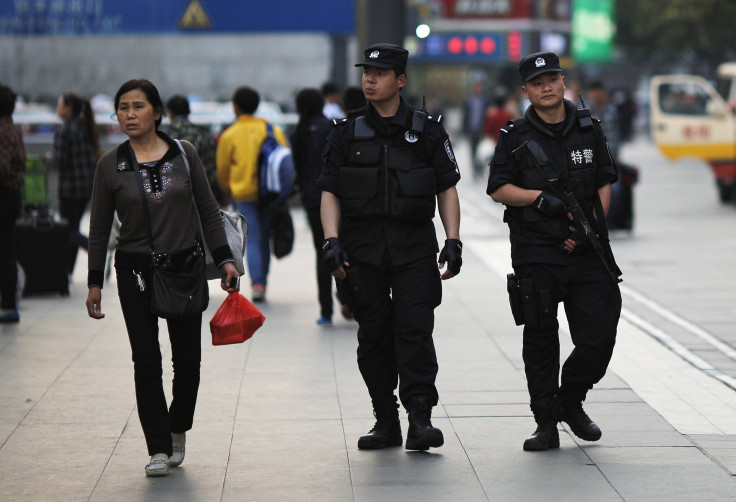China Knife Attack Suspects Linked To ISIS; Some Chinese Extremists Returning From Middle East, Communist Party Boss Says

News reports suggest that Chinese extremists with links to the Islamic State group were responsible for a knife attack at a rail station in China last week. The news comes as the Communist Party boss for the far western Xinjiang province, which borders several Middle East countries, announced that several Chinese extremists were returning to the country after fighting with the so-called Islamic State abroad.
According to Hong Kong newspaper Ming Pao, the two attackers responsible for injuring nine civilians and one police officer in the train station attack in the southern city of Guangzhou on Saturday originally planned to travel to the Middle East to join the Islamic State group, which is also known as ISIS or ISIL. One suspect was shot dead by police, the other was arrested. According to the newspaper, the suspects had planned to be smuggled to Macau, a special administration region of China, and eventually find their way to the Middle East through a Southeast Asian country -- reportedly a common route for Chinese extremists. According to the state-run Global Times, “the illegal issuance of passports and visas and customs loopholes in Southeast Asian countries have allowed extremists to travel to Turkey then go on to join the jihadists.”
Today, Secretary Zhang Chunxian, the Communist Party representative for Xinjiang province, said local authorities had conducted raids and other anti-terror actions against scores of Chinese militants who have returned from the Middle East. “I believe that Xinjiang have [sic] extremists that have joined [the Islamic State group],” Zhang said, according to Reuters. “Recently we broke up a few cases involving those who had returned directly after fighting in war.”
Chinese fighters in the Middle East far outnumber those from largely Islamic nations such as Algeria and Sudan in Africa. In December, Chinese state media estimated that around 300 nationals had gone to Iraq and Syria to fight for the Islamic State group or for Jabhat al-Nusra, an al Qaeda affiliate.
China has been relatively mum about attributing attacks to extremists located in Xinjiang, which is predominately home to the Uighur Muslim minority, in fear of exacerbating preexisting ethnic unrest or sparking domestic terrorism.
“To break the case, to reduce human loss and causalities and ensure security, sometimes you have to keep some things confidential at times,” Zhang said. However, activists and rights groups have called on China to be more transparent in its activities when it comes to dealing with suspected terrorists in the area. In the past, Uighur Muslims have been economically and culturally ostracized by Chinese officials and policies, causing tension and violence in the region.
© Copyright IBTimes 2024. All rights reserved.






















